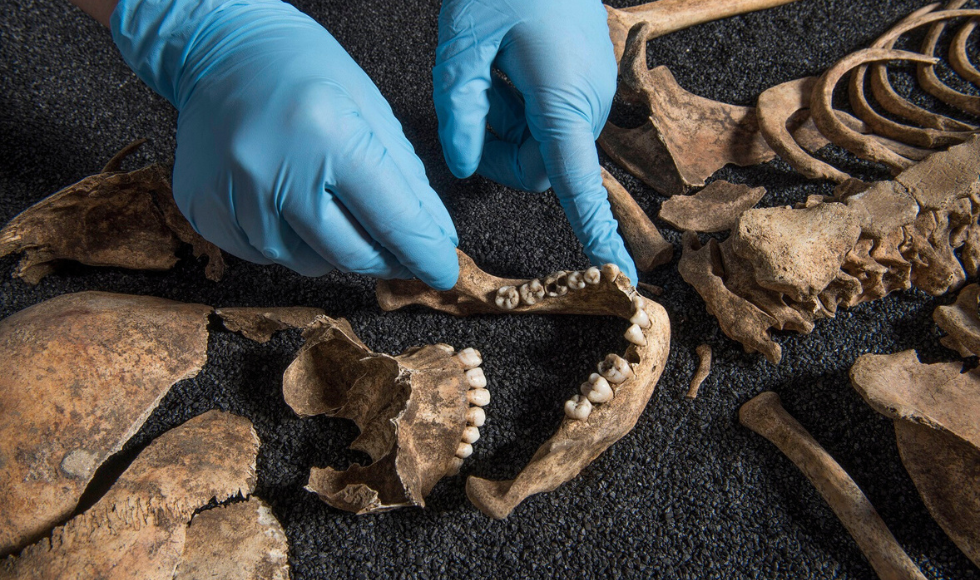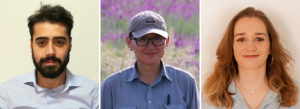New $1M gift supports graduate students in biological anthropology

The Shelley Saunders/Koloshuk Family Scholarship has supported promising McMaster PhD students in biological anthropology since 2008 and has helped McMaster’s Department of Anthropology earn a global reputation as a research powerhouse.
The mysteries of our past can offer important clues for tackling today’s most critical health and societal challenges.
At McMaster University, graduate student Adiyasuren Molor believes ancient Mongolian human remains may unearth certain complexities of the bubonic plague that may prevent future plagues. Alessio Amaro thinks human teeth from medieval Italy might reveal the influence breastfeeding and childhood diet has on mortality rates in males and females. And Céline Jacqueroud hopes to better understand the end-of-life experience by studying fracture patterns in archeological human remains from Italy and the Netherlands.

They are the latest recipients of the Shelley Saunders/Koloshuk Family Scholarship, which has supported promising McMaster PhD students in biological anthropology since 2008. Thanks to a new gift of $1 million from Victor Koloshuk in honour of his late wife, Shelley Saunders, a pillar of McMaster’s Department of Anthropology, top tier students like Molor, Amaro and Jacqueroud will have the means to break — and continue breaking — new ground in biological anthropology.
Due in a large part to the enduring legacy of Saunders, McMaster’s Department of Anthropology has earned a global reputation as a research powerhouse, attracting many of the field’s most prominent experts, including renowned evolutionary geneticists and forensic experts Tracy Prowse, Hendrik Poinar and Megan Brickley.
“McMaster’s continued success and research prowess in biological anthropology is hinged on attracting the best talent from around the world, and I’m proud to support McMaster and the Department of Anthropology,” said Koloshuk.
“Victor believes in the importance of research, collaboration and the pursuit of knowledge,” said Social Sciences Dean Jeremiah Hurley. “These ongoing investments are vital in helping McMaster attract the very best graduate students, and we are honoured to recognize both Shelley and Victor’s family legacy through the Saunders/Koloshuk Family Scholarships.”
Indeed, this gift — one of several Koloshuk has made since the scholarship’s launch in 2008 — comes at a critical time. The Faculty of Social Sciences is currently recruiting new researchers in the areas of biological anthropology and infectious diseases of the past to collaborate with the university’s Global Nexus for Pandemics and Biological Threats.
“As the world emerges from the pandemic, we face pressing issues that require in-depth analysis of historic human society and health that will inform the paths we choose,” said Hurley. “This deepened understanding of our past can uncover contemporary applications that have a tremendous impact on a global level.”
Evolutionary geneticist Hendrik Poinar says this recent gift serves as a cornerstone of McMaster’s research excellence in biological anthropology.
“Saunders’ dedication to biological anthropology was paramount to placing McMaster on the world stage. We are privileged to have the trust of Victor and the Koloshuk family to carry her legacy forward,” he said.
“This kind of support helps us strengthen the capabilities of our department, uphold our global reputation, and continue to attract the best and brightest anthropologists.”
For graduate student Molor, who was inspired by her archeologist grandfather, the scholarship has been life changing. “I knew I wanted to do a PhD abroad, but my family couldn’t afford international tuition,” she said. “In Mongolian archeology, we don’t have specialists in ancient DNA, so it’s a huge gift for me. It’s opening a door to knowledge I wouldn’t otherwise have access to.”

Fellow recipients of the scholarship share her gratitude.
“The scholarship allows me to focus on my studies knowing I have enough resources to live in Canada,” says Jacqueroud, who completed her undergraduate studies in Lyon and Bordeaux, France.
Amaro travelled from Viareggio, Italy, to earn his PhD at McMaster.
“I applied to McMaster because I had heard its Department of Anthropology is one of the best in the world,” he said. “This scholarship is very generous, and it’s given me the opportunity to challenge myself in a new environment, in a new culture.”
Read more about biological anthropology:
Deadly waves: Researchers document evolution of plague over hundreds of years in Medieval Denmark

